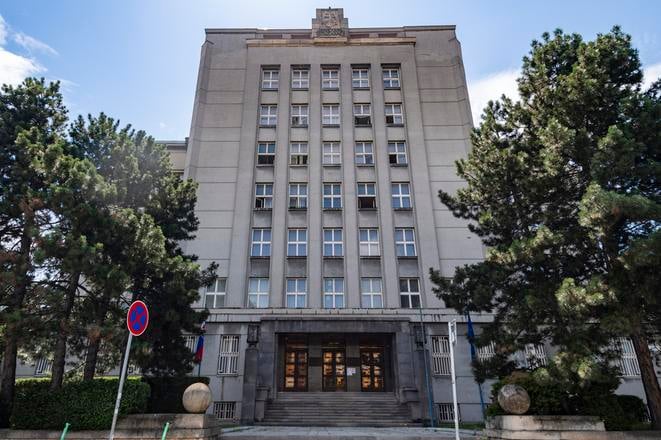The Slovak Interior Ministry has proposed amendments to the Foreigners’ Residence Act and the Asylum Act for cabinet discussion on November 20, bypassing the standard interdepartmental consultation process.
The ministry aims to fast-track the changes through an expedited legislative procedure in parliament, citing the risk of “substantial economic losses” if updates to the electronic foreigner registration system are not completed by year-end.
According to the ministry, the system upgrade is a key element of Slovakia’s EU-funded Recovery Plan. “The electronic upgrade of the ECU information system is a requirement under the Recovery Plan, with a completion deadline of December 2024,” the ministry stated. Failure to meet this deadline would jeopardise €598 million in EU funding, forcing Slovakia to finance the project from its own budget.
Parliament, where Prime Minister Robert Fico’s coalition holds a narrow majority, will reconvene next week after a recess. The ministry is urging the amendments to be enacted by December 15.
What changes are proposed?
Less bureaucracy for firms
In relation to verifying the invitation of a foreign national, it is proposed that for inviters, who are legal entities, the application for invitation verification should include a different document proving the financial means to support the foreign national’s stay. This will be a bank balance statement, from either a local or foreign bank branch, rather than a three-month bank statement, according to the proposal.
Why: The ministry explains that practical experience suggests that for large corporations inviting nationals from third countries to Slovakia for business purposes, providing a three-month bank statement—often spanning several hundred pages—presents an excessive administrative burden.
Electronic applications in some cases
A new provision will allow for electronic submission of applications for the renewal of temporary residence, the renewal of a blue card, the granting of indefinite permanent residence, long-term residence, registration of European Union citizens, and applications for foreign passports.
When: This electronic submission process will be available once the dedicated service is introduced.
Note: A foreign national who submits an application for a residence document electronically and is required to undergo biometric data capture will need to appear in person at a police station for this purpose. In such cases, the deadline for issuing the residence document will be calculated from the date the biometric data is captured.
Foreign passports
A foreign national could submit their application for the issuance of a foreign passport electronically, according to the table proposal.
IDs for Ukrainian refugees
In accordance with the European regulation of June 13, 2002, which establishes a uniform format for residence permits for nationals of third countries, residence documentation in the form of an ID card will now also be issued to Ukrainian refugees. This ID card provides a higher level of protection and, crucially, will allow refugees to travel freely within the European Union, the ministry explains.
Choice: As for those Ukrainian refugees who have already received residence permits under the current regulations (up until 14 December 14, 2024) in paper form, they will have the option to decide whether they are content with the current document or wish to apply for the new ID card.
Transition period: Since the residence permit in the form of an ID card cannot be issued to a refugee immediately after meeting the legal conditions, a temporary residence document will be provided to bridge the gap between the granting of temporary refuge and the issuance of the ID card residence permit. This document will be the same as the one currently issued to refugees (in paper form), writes the ministry in its proposal.
Foreigners’ Police: In order to prevent some departments of the Foreigners’ Police from becoming overwhelmed by the high number of Ukrainian refugees applying for residence documents in the form of ID cards, a new measure has been introduced. Refugees will only be able to apply for residence documentation at designated police stations. The Interior Ministry will, based on the workload of individual departments, allocate specific police stations through its electronic reservation system.
The government had already amended the Foreigners’ Residence Act over the summer, introducing changes such as new conditions for employing highly skilled foreign workers.
Moreover, in recent months, the Foreigners’ Police has faced criticism over issues with its online booking system. Certain groups have been exploiting the system by reserving most of the slots, which they later sell to foreigners.

Booking system issues resolved, says the ministry
The Interior Ministry claims that preventive technical measures have been introduced to improve oversight of the appointment booking process, including a system update requiring foreigners to authenticate themselves with an issued document before securing a slot.
“This will also prevent speculators from trading appointment slots,” the Interior Ministry said, as quoted by the Slovak news agency TASR.
In addition, the ministry has implemented a system allowing selective release of appointments based on applicants’ circumstances. This flexibility enables the Foreigners’ Police to adjust the availability of slots in response to specific needs—for example, increasing slots for students in September or prioritising work permits and driver’s licences at other times.
The Border and Foreigners’ Police Department noted that roughly 20 percent of reserved appointments are missed by applicants, effectively blocking access for others amid high demand for the service.


 The Interior Ministry building in Bratislava. (source: Jaroslav Novák)
The Interior Ministry building in Bratislava. (source: Jaroslav Novák)